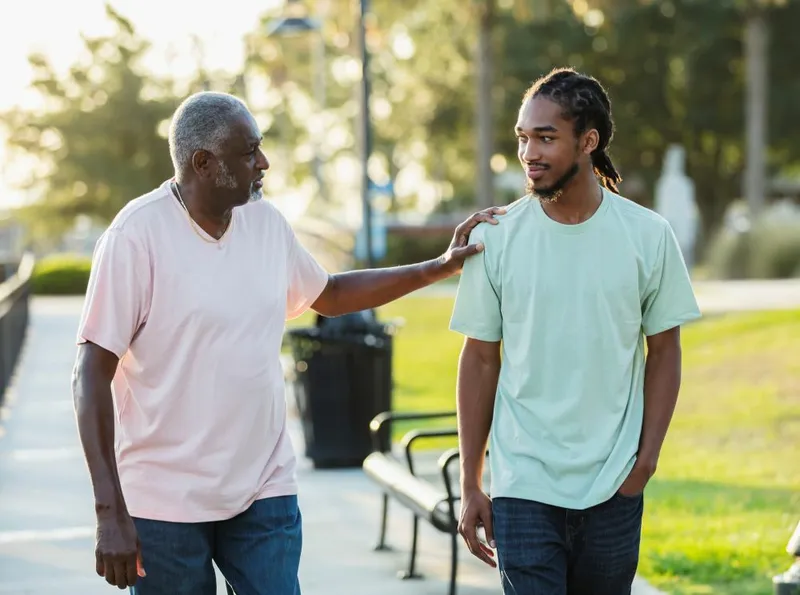Grief & loss

What is grief?
Grief is not just a feeling: It’s an emotional process you may go through after a major life loss. While it’s often associated with death, you can also grieve other losses, like a relationship, friendship, or even an old job or school.
Grief looks different for different people, and there is no right way or amount of time to grieve. Some describe experiencing grief in waves—intense and close together soon after a loss, then smaller and less frequent later on. Others might experience a wave of grief long after a loss, seemingly out of nowhere. However it shows itself, grief can have significant impacts on your mind, body and relationships.
When grieving, you may have a lot of feelings such as shock, guilt, despair, or even relief. Experts typically categorize the grieving process into five stages but note they aren’t meant to be linear and don’t happen for everyone, or with every instance of grief.
The five stages of grief include:
- Denial: Sometimes, we first carry on numb, as if nothing has happened.
- Anger: Loss can feel unfair, and we can feel angry at the person we lost or the forces around us that are associated with the loss.
- Bargaining: This is what we do when we want to change things such as how we feel. We start to try to make deals with ourselves or others to act a certain way, hoping that these actions will allow things to change.
- Depression: Sadness and longing are common emotions that are associated with grief.
- Acceptance: As grief comes in waves, eventually, on no particular timeline, we feel less pain and accept the loss.
Grief can have physical manifestations as well, and affect your concentration, sleep, energy or appetite. For the majority of people, these mental and physical symptoms of grief lessen over time, but if they continue for more than a year and interfere with your functioning, you might have a mental health condition called Prolonged Grief Disorder, which a mental health professional can help to treat.
No one can predict the process that you personally will go through—but knowing how to identify what you’re feeling can help you work through your loss toward a new way of life. Also, there’s no right or wrong way to grieve. It’s important not to ignore or bury your feelings even though that may be tempting.
What's causing it?
When it comes to dealing with loss, grief is a natural human response. Death is one (but not the only) type of loss that can trigger grief. Getting a tough health diagnosis, losing a job or going through a breakup are other very common examples. Any big change in your life such as moving to a new place or losing touch with friends can also cause grief.
There are two main types of grief:
- Normal or uncomplicated grief: This is when the feelings of sadness associated with grief become easier to manage over time, don’t affect your daily routine, and you can learn to cope with them.
- Complicated grief: This is when feeling sad–despite giving yourself a decent amount of time to recover–doesn’t stop and affects your ability to follow your daily routines or enjoy life. There’s a chance this type of grief can become Prolonged Grief Disorder and lead to the need to get mental health help for it.
Other categories of grief are related to the kind of loss or event that triggers it. This is why you may find that the most helpful resources for your grief may be related to the specific loss or event that’s causing you to grieve (for example, the death of a child or a divorce). Grief might look different for different kinds of losses.
Grief can be tricky to recognize and can often emerge unexpectedly. Feelings you might sideline as stress or feeling down can really be grief and are important to identify.
How should I deal with grief?
Experiencing a big loss can leave you feeling shocked and disoriented. It’s important to give yourself time and allow yourself to feel what you feel. Don’t judge yourself for your feelings—there are no good or bad emotions or a “right” way to feel. You may need to get past some intense feelings before you realize you’re in the process of grieving. (Note: It’s totally fine and normal for it to be messy.)
Becoming aware of the grief and understanding that your unique reaction is valid is another important step. You might not grieve in the same way as others, even for the same loss, and that’s OK.
There are steps you can take and ways to get support from others to help you get through it.
Things to try
-
Look for ways to give your mind a break and find moments of happiness, including keeping up with hobbies and interests or exploring new ones. As an added bonus, participating in fun and engaging activities helps us develop resiliency and healthy coping mechanisms, and may even increase how long you live, according to The National Institute on Aging.Explore More
-
Spend some time with a pet
Pets can provide comfort, companionship, and more often than not, a laugh, when you need it most. Science also backs up the benefits of having a pet on your mental health. Spend some time playing with your pet and enjoying each other company. If you don’t have a pet but love animals, consider volunteering at a shelter or visiting a neighbor or a friend with a pet.Explore More -
Try talking about it
It might be that talking about what you're going through is the last thing you feel like doing. Or, it might be that you don't feel like talking to your loved ones about it. Ironically, this is usually a sign that getting something off your chest may be essential to healing. Consider asking a therapist or someone you trust to be a sounding board for you. You only need to start with one person.Explore More
What can I do now?
-
Helpline | Text lineDisaster Distress Helpline (DDH)
-
Online directory | Support groupFind Support Groups | Mental Health America
-
Online interactive tool(s)Take a Mental Health Test | Mental Health America


